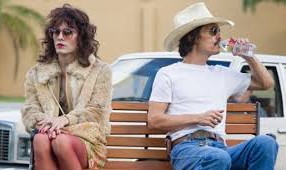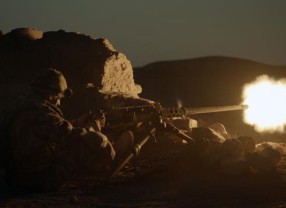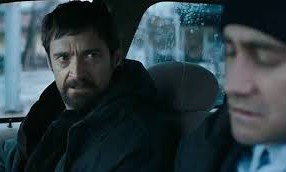Dallas Buyers Club – Film
 In the 1980’s there was no hope for people infected with the HIV virus. Immediately upon diagnosis, the infected were told that they had a short period of time left, perhaps a few months, or less. Dallas Buyers Club is a new film inspired by true events about the life of a man fighting for survival when given a death sentence upon his AIDS diagnosis.
In the 1980’s there was no hope for people infected with the HIV virus. Immediately upon diagnosis, the infected were told that they had a short period of time left, perhaps a few months, or less. Dallas Buyers Club is a new film inspired by true events about the life of a man fighting for survival when given a death sentence upon his AIDS diagnosis.
Ron Woodruff, a drug-taking macho womanizing Texas cowboy and electrician, (Matthew McConaughey), is at the hospital after an electrical accident at his work. It is there, in March 1985, that he is told that he has the HIV Virus. Even worse, he is so thin and sickly that the doctor (Dennis O’Hare) at the hospital tells him that he has 30 days left and that he should get his affairs in order. Woodruff, a straight man, doesn’t believe it. He is not gay, so he doesn’t understand how he could have gotten the HIV virus. He refuses to accept this diagnosis until he reads more about it at the local library. He discovers that it is not just gay men who are getting the virus, but IV drug users as well. Upon reading this, he now knows that he’s in trouble…that he’s got the virus. He then finds himself shunned and ostracized by his friends and co-workers.
Back at the hospital, he is told by one of the doctors, Dr. Eve Sacks (Jennifer Garner), that the only drug available was a drug called AZT. She also explains to Woodruff that it is only available in a drug trial, and that half of the participants will receive the drug, and the other half will receive a placebo. Woodruff, who continues taking illegal drugs (including lots of cocaine), and who continues to lose more and more weight, does not accept this and finds a way to get the real drug (he eventually gets it, illegally, from a hospital cleaner who steals it from the drug cabinets at the hospital). However, taking AZT doesn’t seem to help him as he is getting sicker and sicker, and one day he collapses and ends up back in the hospital. He gets put in the same room as Rayon (Jared Leto), a mid 20-something drag queen who is in the hospital for the same reason as Woodruff (AIDS). Rayon is an old friend of Dr. Sacks, he even asks her her opinion on his choice of outfits. At first Woodruff wants nothing to do with Rayon; Woodruff is anti-gay and doesn’t want to be put in the same category as ‘people like Rayon’. He slowly warms up to Rayon, who has a very simple and charming disposition, with a warm touch which he uses to help Woodruff with a cramp in his leg. The hospital explains to Woodruff that they can’t give him AZT (or any other drugs), and he soon realizes that AZT is making people sicker, even at its sticker price of $10,000 for a year’s supply, and people were still dying on a daily basis. So Ron decides to take his health into his own hands.
Woodruff turns to the black market and finds out about a clinic just over the border in Mexico where he meets expatriate physician Dr. Vass (Griffin Dunne). Vass treats him with drugs that are not approved by America’s FDA (Federal Drug Administration). In the clinic there are very young men, all with AIDS, in bed or who can barely walk, some close to death, all clinging to hope that being at this clinic could save them. It is hard to believe that this was a time when this was reality. Woodruff finds renewed health and hope, and he also sees that he could start a business by smuggling the medications into the U.S. to sell to fellow AIDS patients, so that is what he does. And this operation becomes the Dallas Buyers Club. So Ron enlists Rayon to solicit from her community those gay men who have no hope left, and soon enough, Ron and Rayon have customers lining up at their Dallas business, which they operate out of two motel rooms. In Rayon, Ron finds another person who is sort of an outcast, but they are polar opposites. But it then becomes them against the world – the cowboy and the queen. And Dr. Saks eventually goes against the grain of what she has been taught in school and gets on Ron and Rayon’s side. Unfortunately, Woodruff’s business brings the unwanted attention from the FDA as he is selling drugs that are not permitted to be sold in the U.S., but this does not stop him. He is a walking encyclopedia of anti-viral medications, pharmaceutical trials and patents and appears to know more than the FDA and the doctors treating HIV patients. He would re-stock any supply that was confiscated, he would travel to other countries, including Japan, to get other alternative drugs. Ron was crusader, a man who gave hope to many who didn’t have any. He organised and led an operation whose customer base was 99% homosexuals, and Texas in the 1980’s was undoubtedly one of the worst places to be homosexual or transexual, must less one with AIDS. Woodruff would succumb to complications from AIDS in September 1992, 2557 days after his diagnosis.
It took 20 years for Dallas Buyers Club to make it to the big screen. A month before Woodruff passed away, screenwriter Craig Borten drove from Los Angeles to Dallas, Texas to meet him and to begin work on telling his story. Borten felt that the story of a homophobic cowboy who suddenly found himself on the front lines of the AIDS pendemic was profound and unique. The film went into development in 1997, with producer Robbie Brenner attached to it, but it didn’t get made. In 2000, Borten teamed up with screenwriter Melissa Wallack to rework the script. The movie then went into active development at a studio for nearly a decade. However, in 2009, the rights went back to Borten and Wallack, and Brenner got back on board. And their first choice to play Woodruff was McConaughey. And McConaughey was up to the challenge. “Ron was an American original. He shook the tree. He made noise. I said I want to get this made, get Ron’s story told,” McConaughey has said. Once a director was chosen (Jean-Marc Vallée, the award-winning director of Café de Flor and C.R.A.Z.Y.), it was a go. Production began in mid-2012, with Jared Leto on board as their first choice for Rayon, and Jennifer Garner as Dr. Eve Sacks, after having initially been told about the project by McConaughey. Principal photography began in New Orleans in mid-2012, with a 25-day shooting schedule.
What makes this movie stand out from all other films that have dealt with AIDS is the performance of McConaughey. His performance is better and more realistic than Tom Hanks in the 1993 film Philadelphia. And while Hanks was given lots of makeup to look sick, McConaughey went through an amazing physical transformation to play the frail, emaciated and dying man. It is McConaughey’s best performance in his career, and perhaps the best performance of the year. McConaughey shed nearly 50 pounds to play Ron to drop down to a weight of 140 pounds. However, in one pivotal hospital scene, McConaughey dropped to 135 pounds in order to play the frail, emaciated dying Woodruff, lying on his hospital bed in his underwear, extremely thin. McConaughey also did a lot of research for playing the role, including reading Woodruff’s journals. ““After listening to audiotapes and doing my research, I didn’t feel I needed any more information. Interviews with Ron were so helpful. In listening to Ron talk after seven years with H.I.V., I realised that a man speaks differently about himself and his legacy in retrospect than he does when he’s living it in progress,” McConaughey has said. He eventually went to meet Ron’s family. “But then I did decide to meet with Ron’s family, and that made a difference. It was very informative. They are wonderful people who opened up the library of their house to me, lent me scrapbooks, other tapes, a couple of his diaries, and more.” Viewers of this film will forget they are watching the goodlooking and hunky actor Matthew McConaughey as he amazingly disappears into being Woodruff.
Like McConaughey, Leto also went through a physical transformation to play Rayon. By the time filming began, Leto got down to dangerous 116 pounds. And Leto plays Rayon with charm, emotion, a touch of femininity, honest, vulnerable – he completely nails the character. “I did get in touch with my feminine side, because it’s a strong attribute of the character. In terms of emotions it was important for me to study as much as I could about what it meant to be a transsexual woman, to get at how you see things and what you want out of life,” Leto has said. “Rayon is a ray of light, no pun intended. She is someone who wants to be loved and wants to love others, someone who wants to take care of people with humour and kindness. She looks to be electrified. I think she’s a spirit of hope, joy and optimism,” Leto continues.
Dallas Buyers Club feels like it is a documentary, with a countdown on the screen showing how many days it has been since Ron’s diagnosis. And we see him surviving much longer than the 30 days his doctor initially gave him.
“The way I approached playing him is to never forget that he was a businessman first, a man doing what was necessary to survive. Later on, he became a crusader for the cause, but almost without even knowing it. He helped save so many people, and whether he was doing it for all of us or doing it for selfish reasons, he did it,” McConaughey says.
Dallas Buyers Club is an important movie that excellently captures the era when AIDS was considered a death sentence, the feel, the clothing, the hostility, the fear, the desperation, and the smell of death. It deserves every award it is going to get.
By the mid-1990s, “the AIDS cocktail” combination therapies became accepted (and FDA approved) treatment protocol for HIV/AIDS patients. In reduced doses, AZT was an early ingredient in these lifesaving treatments. These drug combinations have saved and prolonged millions of lives; in a “cocktail combination,” three drugs each attack different elements of viral replication, thereby greatly reducing the effects of HIV. If it wasn’t for people like Woodruff in those early days, many more people with HIV would’ve succumbed to the virus.
 The Patrol, opening today in UK cinemas, is a tense, dramatic and realistic film about four days in the life of a British Army patrol in Helmand Province, Afghanistan.
The Patrol, opening today in UK cinemas, is a tense, dramatic and realistic film about four days in the life of a British Army patrol in Helmand Province, Afghanistan. Two young girls are snatched right outside their homes and their parents, along with the police, frantically try to find them in the very dramatic and highly suspenseful new film Prisoners.
Two young girls are snatched right outside their homes and their parents, along with the police, frantically try to find them in the very dramatic and highly suspenseful new film Prisoners.



